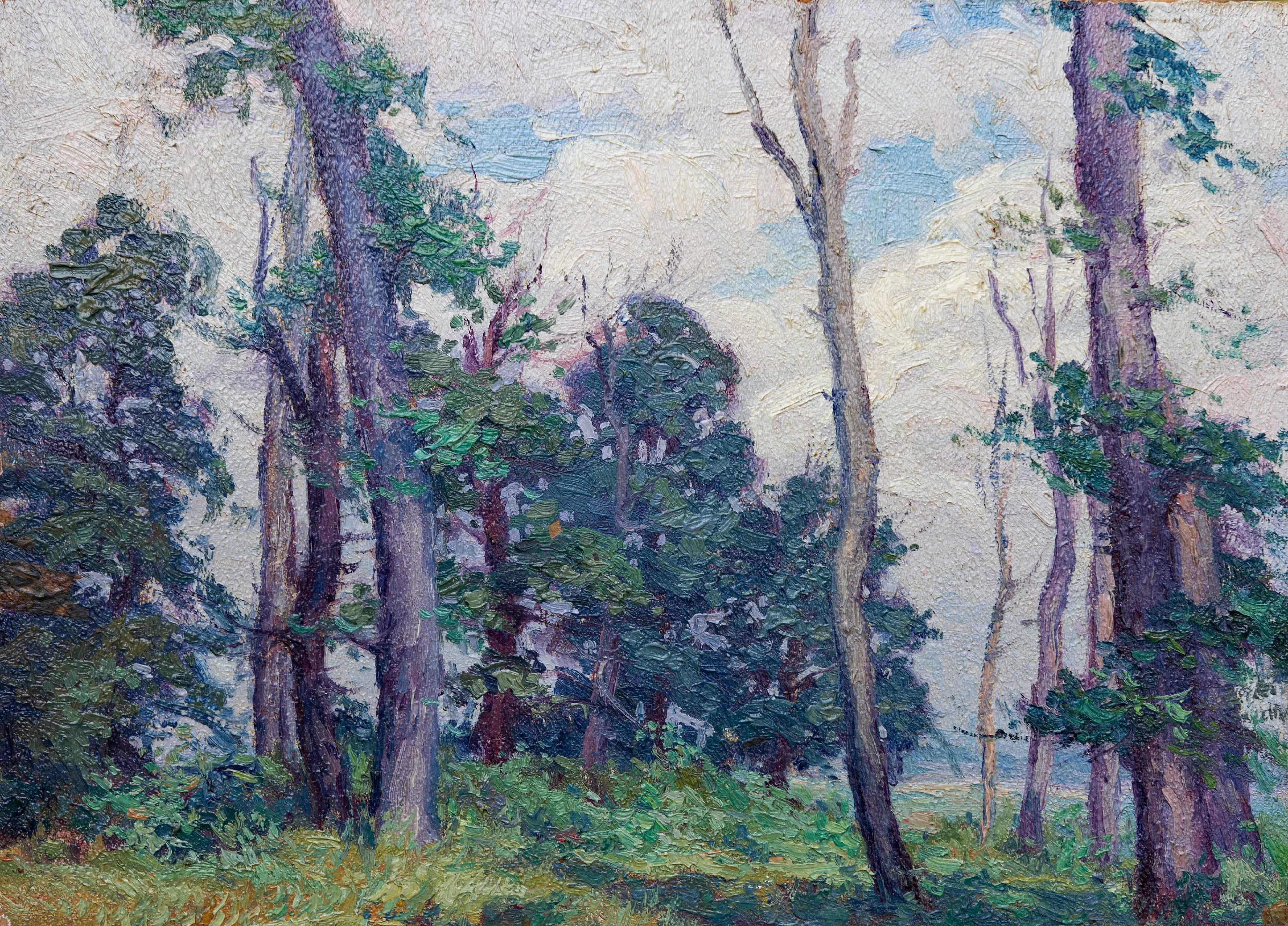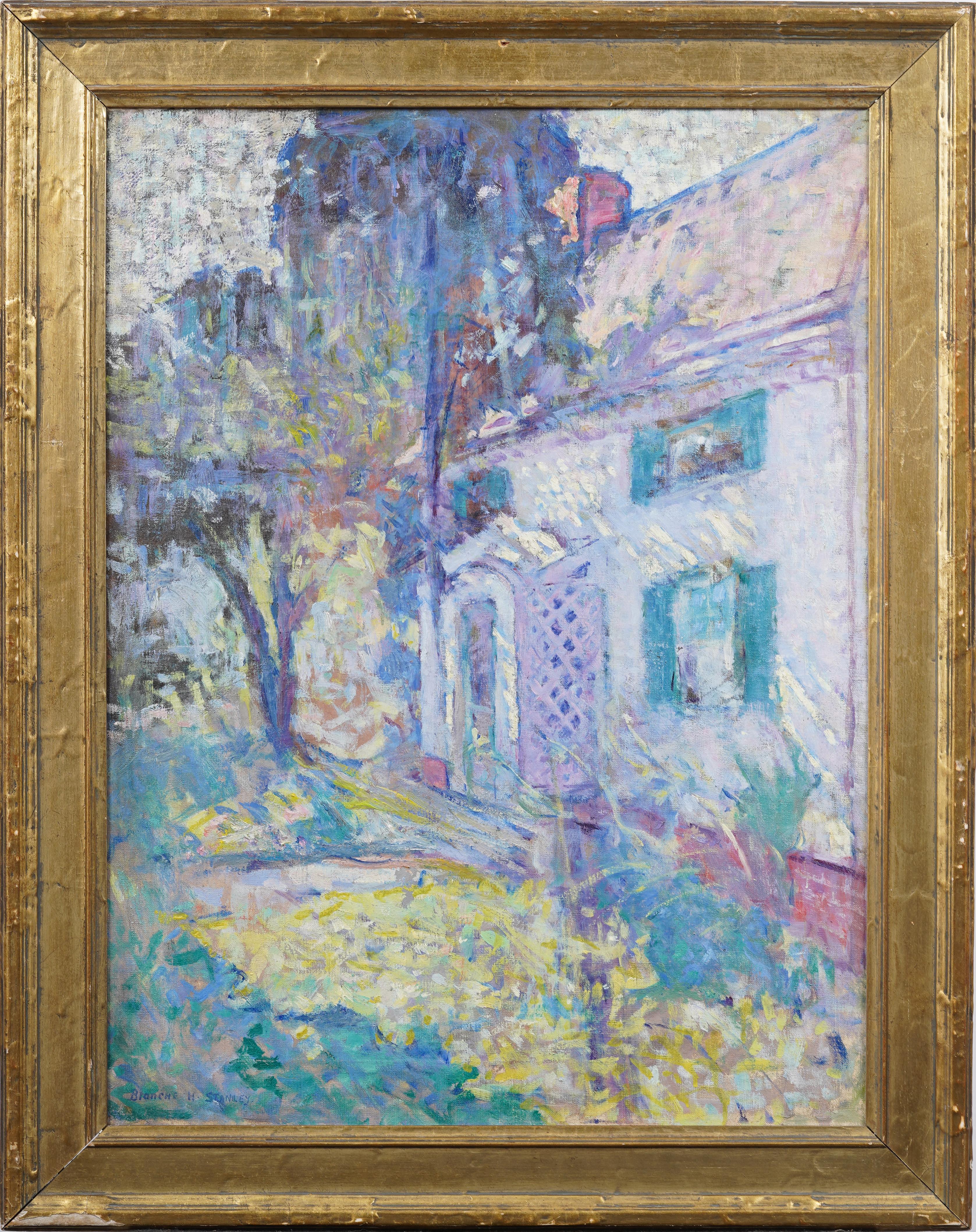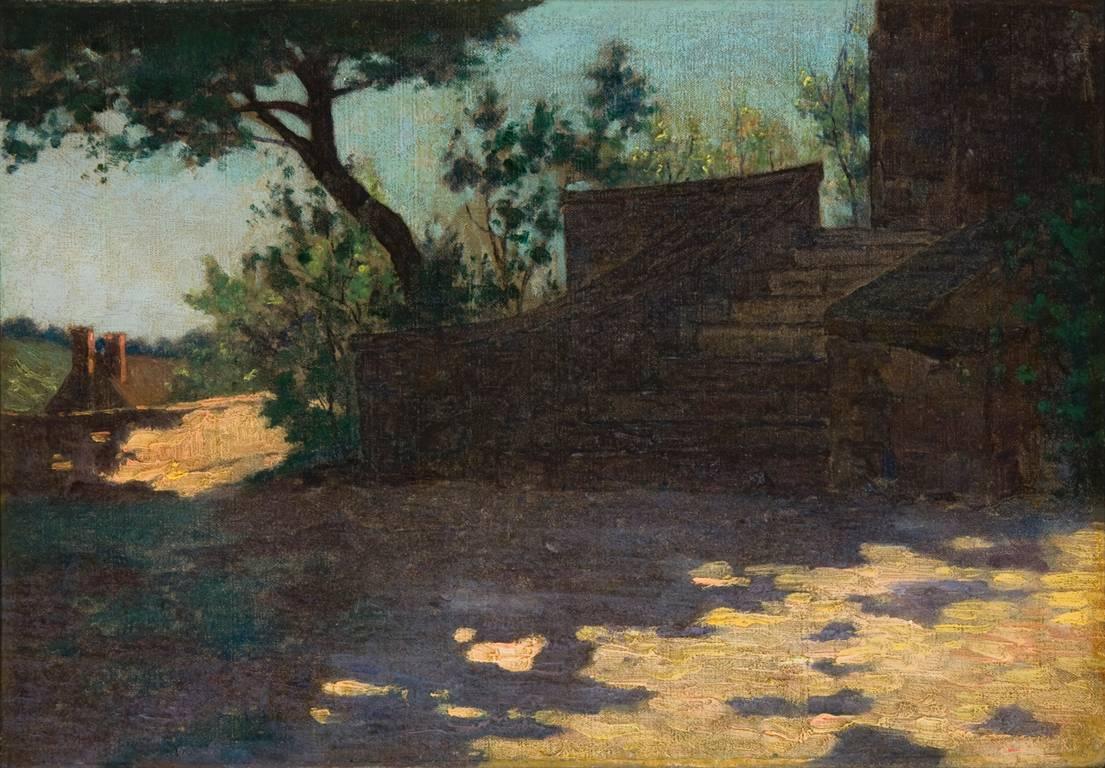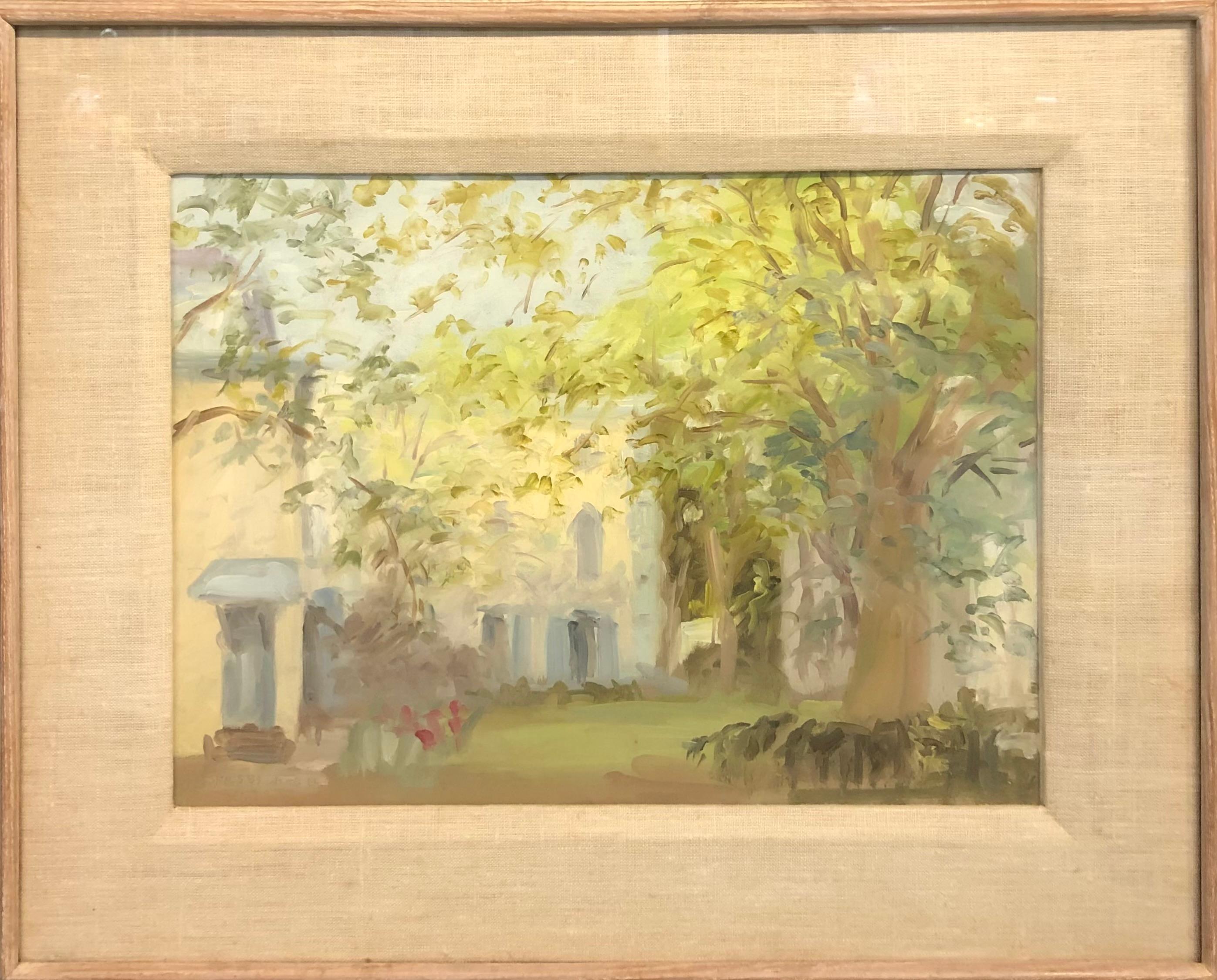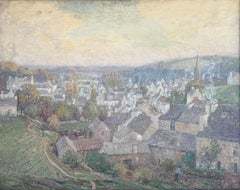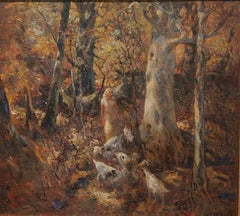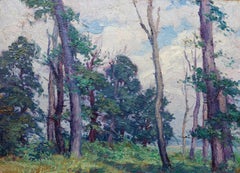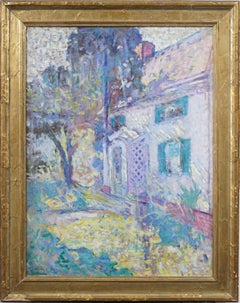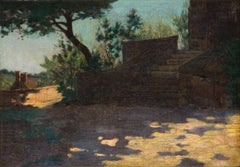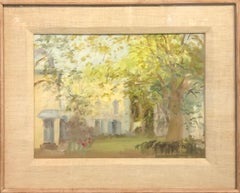Items Similar to "Eleventh Century Romance, " Walter Griffin, American Impressionism Landscape
Want more images or videos?
Request additional images or videos from the seller
1 of 9
Walter Griffin"Eleventh Century Romance, " Walter Griffin, American Impressionism Landscape
$11,000
£8,351.01
€9,551.78
CA$15,368.60
A$17,093.23
CHF 8,925.55
MX$208,006.46
NOK 113,992.96
SEK 106,905.28
DKK 71,288.57
Shipping
Retrieving quote...The 1stDibs Promise:
Authenticity Guarantee,
Money-Back Guarantee,
24-Hour Cancellation
About the Item
Walter Griffin (1861 - 1935)
Eleventh Century Romance
Oil on canvas
34 x 36 inches
Signed lower right; signed on the reverse and titled on the stretcher
Born in Portland, Maine on 14 January 1861, the son of Lydia Libby and Edward Souther Griffin, a successful woodcarver, Walter began studying art under his father. First, he learned the techniques of sculpture, carving pictorial bas-reliefs, decorative works and small figures. Even as a youth, Walter attempted to capture the likenesses of local mariners who visited his father's studio and he was allowed to accompany his father on sketching trips with the group. At the age of seventeen, Walter left home to attend the recently established School of the Museum of Fine Arts, Boston, where he won a scholarship. Here in 1878, his first teacher was Emil Otto Grundmann, and some of his fellow students include Edmund Tarbell, Frank W. Benson and Dennis Miller Bunker. Walter excelled as a draftsman, following Grundmann's strictly academic training of sketching plaster casts of Antique sculpture and working out problems in compositional design. By 1882, Griffin had reached a certain technical plateau and he decided to move on to study at the National Academy of Design.
In New York, Griffin was guided by Lemuel Wilmarth, director of the Academy school. After only one year, Griffin received a medal for the best figure drawing. He decided to continue his training in Paris; in August 1887 he sailed for England, then hastened to France to enroll at the Académie Julian, along with the multitude of other young aspiring Americans. At first, Griffin continued with his typical genre subjects, exhibiting such works at the 1889 Salon (L'intérieur), then moved to the country, near the former residence of Jean-François Millet. Here he was inspired by the Barbizon School style but he also discovered the vibrant techniques of impressionism, and by the early 1890s, we are able to discern a loosening of Griffin's brushwork. During travels throughout France, Griffin filled numerous sketchbooks then sailed home in 1897 to take the position of director of the School of the Society of Art in Hartford, Connecticut. Concurrently, he was appointed director of the Hartford Museum and Art School.
The beginning of Griffin's impressionist period coincides with his discovery of Old Lyme and in 1905 he became a resident member of the artists' colony. Childe Hassam became one of Griffin's closest friends. Griffin developed his technique further, which might best be described as a sketchy application of small mosaic-like brushstrokes, at times quite contrasting in tonality — a combination of small opaque strokes and corresponding areas of open translucent underglaze. He also began the execution of some of his finest works, the well known hard-point pastels. For the most part, these usually small and delicately luminous works are daringly expressionistic as compared to oils of the same period. They frequently display a unique and personal style, characterized by an extremely busy albeit pleasing combination of clustered patterns and a swirling linear spontaneity. Griffin also traveled to Monhegan Island with the independently wealthy artist William Singer, Jr., who became his life-long friend. He experimented further the following year in Brittany, by applying dashes of rich impasto pigment with a palette knife to the canvas. The outlines of forms are diffused in an ambiguous spatial complex. Griffin's election as an Associate in the Academy in 1912 helped to further his fame in his own country.
In 1913 Griffin went to Venice where he painted with indefatigable energy. At that time, he established a new secure technique, a brilliance of color vibration, and a sureness of handling. After years of experimentation and development, Griffin had achieved a definitive, unique style. 1915 was an eventful year for Griffin. Besides exhibiting at the National Academy, he was given a one-man show at the Portland Museum, and he won a Medal of Honor at the Panama-Pacific International Exposition in San Francisco, where eight of his paintings were on view. In almost each instance, his new style was well received. Yet conservative critics such as Eugen Neuhaus described Griffin's technique as "careless" and his pictures "so openly disregard technical rules in their careless superimposition of unnecessary paint. . . ." Numerous exhibitions followed, and in 1922, at age 61, Griffin was elected to full membership in the National Academy of Design.
In the spring of 1926 Griffin visited Matisse, then he discovered the picturesque village of Contes. His style changed slightly, as he became even more influenced by the light of the Riviera. After around three years at Contes, Griffin, now in his seventies, decided to retire to his native Portland. He was a "fixture" at the Portland Museum until his declining health forced him to stay away. Griffin died at the age of seventy-four; his passing was followed by the death of Hassam three months later.
- Creator:Walter Griffin (1861 - 1935, American)
- Dimensions:Height: 34 in (86.36 cm)Width: 36 in (91.44 cm)
- Medium:
- Movement & Style:
- Period:
- Framing:Framing Options Available
- Condition:
- Gallery Location:New York, NY
- Reference Number:1stDibs: LU1841210631332
About the Seller
5.0
Platinum Seller
Premium sellers with a 4.7+ rating and 24-hour response times
Established in 2022
1stDibs seller since 2022
114 sales on 1stDibs
Typical response time: <1 hour
- ShippingRetrieving quote...Shipping from: New York, NY
- Return Policy
Authenticity Guarantee
In the unlikely event there’s an issue with an item’s authenticity, contact us within 1 year for a full refund. DetailsMoney-Back Guarantee
If your item is not as described, is damaged in transit, or does not arrive, contact us within 7 days for a full refund. Details24-Hour Cancellation
You have a 24-hour grace period in which to reconsider your purchase, with no questions asked.Vetted Professional Sellers
Our world-class sellers must adhere to strict standards for service and quality, maintaining the integrity of our listings.Price-Match Guarantee
If you find that a seller listed the same item for a lower price elsewhere, we’ll match it.Trusted Global Delivery
Our best-in-class carrier network provides specialized shipping options worldwide, including custom delivery.More From This Seller
View All"French Landscape" Wilson Irvine, American Impressionist Rural French Town
Located in New York, NY
Wilson Irvine
French Landscape, circa 1908
Signed lower right
Oil on canvas
29 x 36 inches
A prolific Impressionist with a penchant for atmospheric scenes, Illinois native Wilson I...
Category
Early 1900s American Impressionist Figurative Paintings
Materials
Canvas, Oil
"MacMahan's Maine, " Howard Everett Giles, Figurative Landscape, Impressionism
Located in New York, NY
Howard Everett Giles (1876 - 1955)
MacMahan's Maine
Oil on canvas backed with board
30 x 30 inches
Signed lower right
Provenance:
Art Institute of Chicago
Christie's New York, December 8, 2011, Lot 2
Howard Giles spent most of his career in New York City, where he was an educator, magazine illustrator, and painter who espoused the theory of Dynamic Symmetry. He was born in Brooklyn, and as a young man worked in a New York railroad office. Financial support of a family friend allowed him to study at the Art Students League with H. Siddons Mowbray. In early 1910, he became an illustrator for Scribner's Magazine, and in 1912, on sketching assignment for Scribner's went to England. During World War I, he did illustration for Harper's Monthly Magazine, and many of his images were 'roaring twenties' genre and figure paintings.
In 1912, he began teaching life classes at the New York School of Fine and Applied Arts (later Parsons School of Design), and remained there until the late 1920s. During that time, he was also a part-time instructor at the Childs-Walker School in Boston, and accepted numerous invitations to lecture including at Carnegie Institute in Pittsburgh, Pennsylvania Academy of the Fine Arts, Detroit Institute of Arts and Wellesley College.
His initial painting style was Impressionism, but he grew increasingly interested in other scientific, aesthetic theories. He worked with Jay Hambridge from 1916 to 1919, applying Hambridge's theory of Dynamic Symmetry to his painting and his lecture topics. From 1922 to 1926, Giles also worked with and was influenced in his own painting by colorist theorist Denman Ross, who espoused a limited and related color palette. For many of his paintings, Giles used watercolor although he also painted in oil and pastels.
During the last years before his retirement when he moved to Woodstock...
Category
Early 20th Century American Impressionist Landscape Paintings
Materials
Oil, Panel
"Late Summer" Carl Wuermer, Pointilism, American Impressionism August Landscape
By Carl Wuermer
Located in New York, NY
Carl Wuermer (1900 - 1981)
Late Summer, 1924
Oil on canvas
26 x 28 inches
Signed and dated lower right
Provenance:
McColl Fine Art, North Carolina
Known for serene, realistic lands...
Category
1920s Pointillist Landscape Paintings
Materials
Canvas, Oil
"Through the Woods" John E. Costigan, Early 20th Century Landscape Painting
Located in New York, NY
John Edward Costigan
Through the Woods
Signed lower right
Oil on masonite
30 x 27 1/2 inches
John Costigan was a self-taught painter and trained printer distinguished by his impres...
Category
Mid-20th Century Landscape Paintings
Materials
Canvas, Oil
"Forest Landscape" John F. Carlson, circa 1925 American Impressionist Landscape
By John F. Carlson
Located in New York, NY
John F. Carlson
Forest Landscape, circa 1925
Signed lower right
Watercolor on paper
Sight 21 x 24 1/2 inches
The native Sweden John Fabian Carlson became a household name in New Yo...
Category
1920s American Impressionist Landscape Paintings
Materials
Paper, Watercolor
"Green Landscape" Arthur Hoeber, Gestural Landscape, American Post Impressionist
By Arthur Hoeber
Located in New York, NY
Arthur Hoeber
Green Landscape
Signed lower right
Oil on canvas
25 x 30 inches
Arthur Hoeber was an American painter best known for his writing on art-...
Category
Late 19th Century Modern Landscape Paintings
Materials
Canvas, Oil
$3,600 Sale Price
20% Off
You May Also Like
Impressionist Landscape by American Artist George Renouard
By George Renouard
Located in Rochester, NY
Impressionist landscape by George Renouard. Beautiful blues and mauves. Oil on academy board. Unsigned.
George Renouard, was born in Rochester, New York and lived much of his life ...
Category
Early 20th Century Landscape Paintings
Materials
Oil, Board
Antique Exhibited American New Hope PA Impressionist Framed Landscape Painting
Located in Buffalo, NY
Rare early American impressionist landscape painting by Blanche Huntington Stanley. Oil on canvas. Exhibited. Signed. Handsomely framed.
Category
1920s Impressionist Landscape Paintings
Materials
Canvas, Oil
Untitled
By Hugh Henry Breckenridge
Located in Dallas, TX
signed "Hugh H. Breckenridge" at lower left
Category
Early 20th Century American Impressionist Landscape Paintings
Materials
Canvas, Oil
Untitled - Impressionist Plein Air Landscape Painting
By Stuart Shils
Located in East Quogue, NY
Impressionist style plein-air landscape painting of trees and buildings by Stuart Shils. Oil on paper mounted on rag board.
Image size: 12.75 x 17.75 inches. Frame size: 20 x 25 x ...
Category
1980s American Impressionist Landscape Paintings
Materials
Paper, Oil, Board
Hallman's, American Impressionist Landscape with Figures and Farmhouse
By Albert Van Nesse Greene
Located in Doylestown, PA
"Hallman's" is a landscape with figures and farmhouse, by American Impressionist painter Albert Van Nesse Greene. The painting is a 13.5" x 19....
Category
Mid-20th Century American Impressionist Landscape Paintings
Materials
Pastel, Archival Paper
Landscape
Located in San Francisco, CA
This artworl "Landscape" c. 1935 is an oil painting on hardboard by renown California artist Frank Joseph Girardin, 1856-1945. It is signed at the lower right corner. The hardboard size is 20 x 30 inches, framed size is 30.5 x 40.5 inches. Framed in a wooden beige frame, with fabric liner. It is in excellent condition.
About the artist:
Born in Louisville, Kentucky in 1856, Frank joseph Girardin began his art instruction in 1870 under Frank Noble and later Frank Duveneck at the Cincinnati Art Academy. A semi-pro baseball player in Cincinnati, he was best known for his beautiful landscapes of both Indiana and California.
An extremely active participant in the development of the Art Association of Richmond and original member of the local Sketch Club, he served on the Board of Directors of Art Association for several years. He was considered ranked next to the late John E. Bundy in talent and skill by the former Art Association Director, Mrs. Ella Bond Johnston. It was during his time in Indiana, that he received the most recognition for his work. In 1903, he won first prize for his painting, "Lingering Snow" at the Cincinnati Art Club Show. This would be one of numerous prizes and awards the he would receive during his time in Indiana, including the coveted Mary T...
Category
Mid-20th Century American Impressionist Landscape Paintings
Materials
Oil
More Ways To Browse
Walter Design
Walter Brown
South America Impressionist
Walter Paris
Antique Griffin
Romance Was Born
French Griffin
Portland Maine
Antique Native American Painting
Oil On Canvas Paintings By Walter Landscape
South Pacific Painting
Griffin Sculpture
Frank L Sculpture
Dior Riviera
Antique Sketchbooks
Frank Miller
Monhegan Paintings
Jean Francois Millet
